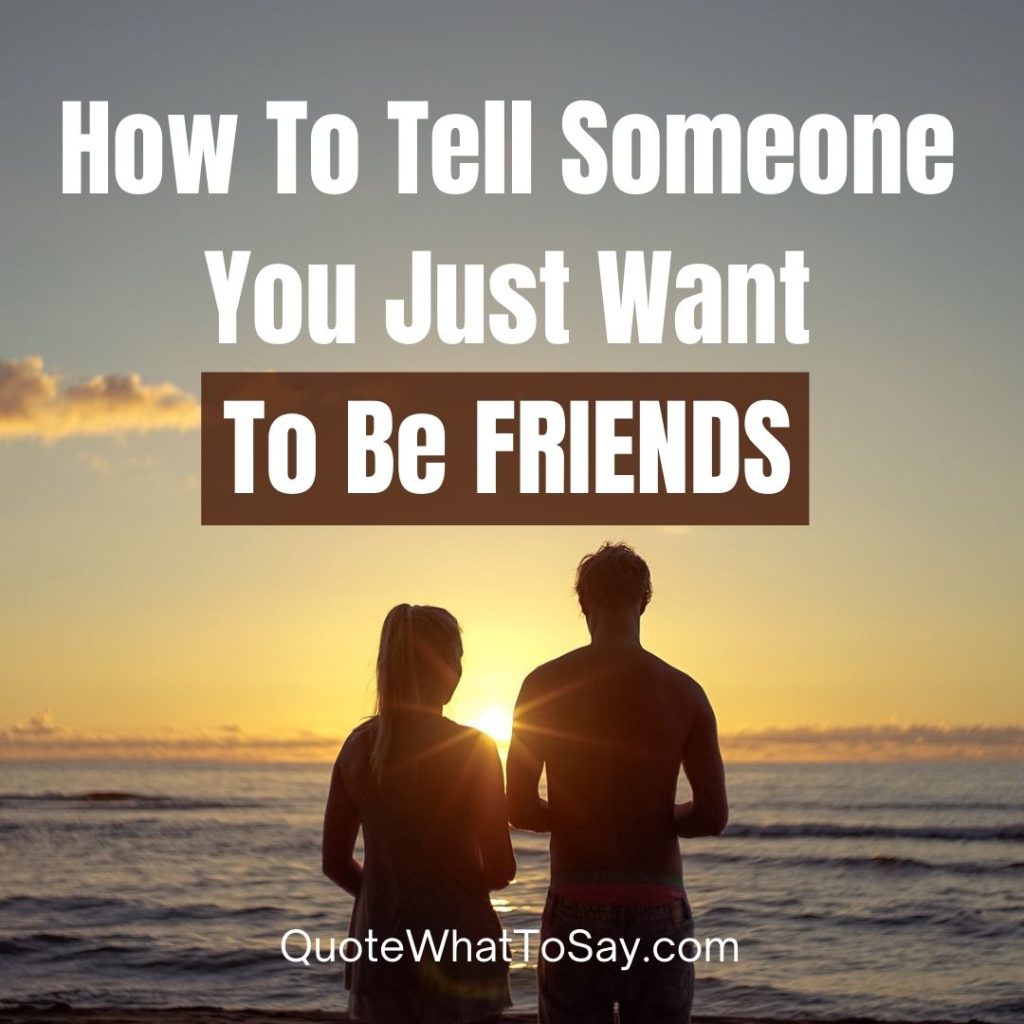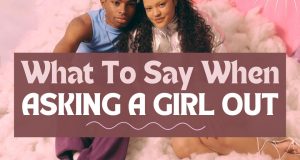Navigating relationships can be challenging, especially when you realize that a romantic connection is not what you’re looking for.
It is important to be honest about your feelings while remaining considerate of theirs, whether it is a budding relationship or someone expressing interest in you.
Telling someone you just want to be friends can feel uncomfortable, but with the right approach, you can communicate your intentions clearly and kindly.
By being respectful and thoughtful, you can preserve the friendship while staying true to yourself.

Why It is Important to Be Honest
When feelings are involved, honesty is always the best policy. Misleading someone, whether intentionally or unintentionally, can cause greater hurt in the long run. If you allow a romantic dynamic to persist when your heart is not in it, resentment and frustration can build, damaging the relationship entirely.
Clear communication, on the other hand, ensures both parties have a fair understanding of where they stand, creating a foundation of trust – even if the result is not exactly what one person hoped for.
Being honest also helps you maintain your own integrity. It shows that you respect yourself and the other person enough to confront the truth, even when it is difficult.
When to Have the Conversation
Timing is crucial when you need to have a delicate conversation like this. Consider these factors to help you determine the right moment:
Choose Privacy: This is not a conversation to have in a public setting or when other people are present. A private and comfortable space ensures that the person feels safe to express their emotions.
Avoid Emotional Highs and Lows: Do not bring this up during an argument, after a particularly happy moment, or during a stressful time for the other person. A neutral moment where you both can calmly talk is ideal.
Be Prompt but Thoughtful: While it is important not to rush the conversation, delaying it unnecessarily can make things worse. Once you have decided that friendship is the only way forward, it is best to address it sooner rather than later.
How to Start the Conversation
Starting the conversation is often the hardest part. The goal is to approach it with empathy and clarity. Be direct about your feelings, but also show that you have considered the other person’s emotions.
The key is to strike a balance between honesty and kindness. Here are some opening lines to consider:
- “I’ve come to realize something about us that I’d like to share.”
- “I want to have an open and honest conversation about my feelings.”
- “You’ve been great, but I think it’s time to talk about what’s next for us.”
- “I value you as a person, and I think we should talk about where we stand.”
- “It’s important to me to be honest about how I’m feeling in our relationship.”
- “I want to be open and transparent about my feelings toward our relationship.”
- “You mean a lot to me, and I want to share something that’s been on my mind.”
- “I care about you and our relationship, so I want to be honest about something.”
- “I respect you and value what we have, so I want to be honest about my feelings.”
- “I’ve realized something about my feelings, and I think it’s best to share it with you.”
- “I’ve been reflecting on our relationship, and I think we need to have a conversation.”
- “I want to talk to you about how I feel because I respect you and value our connection.”
- “There’s something on my mind I’d like to discuss because it feels important to be clear.”
- “I’ve been thinking about our relationship, and I feel it’s important to be honest with you.”
- “I’ve really enjoyed spending time with you, but I think it’s important to talk about something.”
- “You’re a wonderful person, and I want to talk openly about where I see our connection going.”
- “I really appreciate the time we’ve spent together, but I think we need to talk about where we stand.”
Telling Someone You Just Want to be Friends – Common Scenarios
Here are examples on how to handle the 3 common scenarios – a friend who wants more than being a friend, someone you have just started dating, or someone you are already in a relationship with.
Scenario 1: A Friend Who Wants More
When a close friend confesses romantic feelings, it can feel awkward to navigate. You do not want to lose the friendship, but you also need to set boundaries.
In this case, emphasize how much you value the friendship. Examples of what to say:
- “I think you’re amazing, but I see us as just friends.”
- “I care about you deeply, but I only see us as friends.”
- “I value you as a friend, and I hope we can stay that way.”
- “You’re very special to me, but I only see you as a friend.”
- “I treasure our friendship, and I’d like to keep it that way.”
- “I respect your feelings, but I think we’re better as friends.”
- “I see you as family, and I wouldn’t want to risk losing that.”
- “I’ve always thought of you as a great friend, and I hope that’s okay.”
- “I’ve always seen you as a friend, and I hope we can keep it that way.”
- “You’re one of my closest friends, and I don’t see us as more than that.”
- “I want to be upfront – I see us more as friends than anything romantic.”
- “I don’t want to hurt you, but I think of you as a close friend, not more.”
- “I think you’re amazing, but I see us as friends, not something romantic.”
- “I hope this doesn’t hurt you, but I don’t see us being more than friends.”
- “Your friendship means the world to me, and I wouldn’t want to lose that.”
- “You mean so much to me as a friend, but I don’t feel a romantic connection.”
- “I think we have something special as friends, and I don’t want to change that.”
- “I value our bond as friends, and I don’t want to complicate that with romance.”
- “I understand how you feel, and I want to be honest – I don’t feel the same way romantically.”
- “I really value our friendship, and I wouldn’t want to risk that by pursuing something romantic.”
- “I want to be honest with you because I respect you. I see our connection as a friendship rather than something romantic.”
- “I’ve really enjoyed getting to know you, but I’ve realized that my feelings aren’t romantic. I value you as a person, and I hope we can stay friends.”
- “I think you’re an amazing person, but I don’t feel a romantic connection between us. I hope we can continue being friends if you’re open to that.”
- “Your friendship means so much to me, and I wouldn’t want to lose that. I don’t feel the same way romantically, but I hope we can stay close as friends.”
Scenario 2: Someone You Have Just Started Dating
In early dating stages, it is easier to pivot toward friendship, but clarity is still essential:
- “You’re awesome, but I think we’re better off as just friends.”
- “I think you’re great, but I don’t see us as a romantic match.”
- “You’re wonderful, but I don’t see this moving beyond friendship.”
- “I’ve enjoyed getting to know you, but I don’t feel a romantic spark.”
- “I really like you as a person, but I think this is better as a friendship.”
- “You are a fantastic person, but I think we’re better suited as friends.”
- “I want to be honest – I don’t feel a romantic connection between us.”
- “I’ve had a great time with you, but I think we’d work better as friends.”
- “I think we’d make great friends, but I don’t feel a romantic connection.”
- “I’ve enjoyed spending time with you, but I think we’d be better off as friends.”
- “I’ve been reflecting, and I feel our connection is more friendly than romantic.”
- “I don’t feel a romantic connection, but I’d love to stay friends if you are open to it.”
- “I appreciate the time we’ve spent together, but I don’t see a romantic future for us.”
- “I’ve enjoyed getting to know you, but I don’t feel a romantic connection. I think we’d be great as friends if that’s something you’d be open to.”
Scenario 3: A Romantic Partner
If you are already in a relationship but feel it is not working romantically, the conversation might be more complex. Be honest about your feelings while expressing gratitude for the time you have spent together with him / her:
- “You’ve been amazing, but I feel we’d be happier as friends.”
- “I think highly of you, but I don’t see us continuing romantically.”
- “I don’t want to hurt you, but I think we’d be better off as friends.”
- “I care about you, but I think our paths are better aligned as friends.”
- “I think you’re wonderful, but I see us more as friends than partners.”
- “I’ve come to see our relationship more as a friendship than a romance.”
- “I value the time we’ve shared, but I believe we’re not a romantic match.”
- “I think you’re amazing, but my feelings for you aren’t romantic anymore.”
- “You’re an incredible person, but I think we’re more compatible as friends.”
- “I’ve been reflecting on our relationship, and I think we’re better as friends.”
- “I’ve loved our time together, but I don’t feel a romantic connection anymore.”
- “I’ve really enjoyed our time together, but I feel we’re better suited as friends.”
- “I want to be honest – I feel we work better as friends than romantic partners.”
- “You mean a lot to me, but I believe our relationship works better as a friendship.”
- “I want to be upfront – I think our connection is stronger as friends than as partners.”
- “I appreciate everything about you, but I think we should transition to being friends.”
- “You’ve brought so much into my life, but I think our connection is more friendship than romance.”
- “I’ve loved the time we’ve shared, but I feel that we’re better suited as friends. I don’t want to lead you on, and I hope we can transition into a friendship if that feels right for you.”
What to Say: Tips for a Compassionate Conversation
1. Be Clear and Direct
Avoid vague statements that could be misinterpreted. For example, saying “I’m not ready for a relationship right now” might give false hope. Instead, make it clear that your lack of romantic interest is not about timing – it is about compatibility.
2. Use “I” Statements
Frame your feelings in a way that takes ownership of them. For instance, “I don’t feel a romantic connection” is better than “You are not my type,” which could come across as hurtful or critical.
3. Acknowledge Their Feelings
Recognize that this might be disappointing or even painful for the other person. A statement like, “I understand this might not be easy to hear, and I’m sorry if it hurts,” shows empathy.
4. Reaffirm Their Value
Let them know that your decision is not a reflection of their worth. Highlight the positive aspects of your friendship and their character, which can help soften the blow.
5. Offer Space if Needed
Understand that the other person may need time to process their emotions. If they seem upset or distant, give them the space they need without pressuring them to immediately return to a friendship dynamic.
What to Avoid
1. Mixed Signals
Do not leave room for ambiguity or false hope. Statements like “Maybe in the future” or “I just need time” can prolong the situation unnecessarily.
2. Criticism or Blame
Avoid making the conversation about their perceived flaws. Focus on your feelings rather than pointing out things you do not like about her/him.
3. Public or Casual Settings
A serious conversation like this deserves a private, thoughtful environment. Public or informal settings might make the other person feel disrespected or embarrassed.
4. Delaying the Truth
Prolonging the inevitable only makes things harder for both parties. Be honest as soon as you’re certain about your feelings.
After the Conversation: What Comes Next
1. Respect Their Response
The other person may need time to adjust to the new dynamic. They might feel hurt or even need to take a step back from the friendship for a while. Respect their boundaries and allow them to process their emotions.
2. Maintain Boundaries
If you have expressed that you want to remain friends, ensure your actions reflect that. Avoid behaviors that could be misinterpreted as romantic or flirtatious.
3. Check In (If Appropriate)
After some time has passed, it is okay to check in to see how they are feeling. This shows that you care about their well-being, but be cautious not to push if they are not ready.
The Importance of Empathy
It is important to remember that rejection can be painful. Even if you are confident that you have approached the conversation in the best way possible, the other person might still feel hurt, and that is okay.
Empathy is key to navigating this situation gracefully. Acknowledge their feelings, and do not take it personally if they need space or react emotionally.
Key Takeaway: How To Tell Him / Her You Just Want to Be Friends
Telling someone you just want to be friends is never easy, but it is a necessary step when your feelings do not align with theirs.
By choosing the right time and place, communicating honestly and compassionately, and respecting their response, you can handle the situation with grace.
While it may take time to adjust, this approach gives you the best chance of preserving the friendship – or at the very least, parting ways respectfully.
Remember, honesty and kindness go a long way in fostering healthy relationships, even when they take an unexpected turn.





No Responses